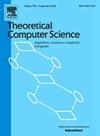关于具有卡片数量限制的 MAX-SAT
IF 0.9
4区 计算机科学
Q3 COMPUTER SCIENCE, THEORY & METHODS
引用次数: 0
摘要
我们考虑的是加权 MAX-SAT 问题,它有一个额外的约束条件,即最多有 k 个变量可以设为 true。我们称这个问题为 k-WMAX-SAT。这个问题允许在多项式时间内使用 (1-1e)- 因子近似算法[Sviridenko, Algorithmica (2001)],并且证明对于最大覆盖率(k-WMAX-SAT 的非加权单调版本),在 f(k)⋅no(k) 时间内没有 (1-1e+ϵ)- 因子近似算法[Manurangsi, SODA 2020]。因此,我们在参数化复杂度领域研究了该问题的两个限制版本。1.当输入是一个无权 2-CNF 公式时(该问题称为 k-MAX-2SAT),我们设计了一个高效的多项式大小近似内核化方案。也就是说,我们设计了一种多项式时间算法,在给定 2-CNF 公式 ψ 和 ϵ>0 的情况下,将输入实例压缩为 2-CNF 公式 ψ⋆,使得 ψ⋆的任何 c 近似解都能在多项式时间内转换为 ψ 的 c(1-ϵ)- 近似解。当输入为平面 CNF 公式时,即2 .当输入为平面 CNF 公式时,即变量句入射图为平面图时,我们展示了以下结果:-存在一种平面 CNF 公式 k-WMAX-SAT 的 FPT 算法,其运行时间为 2O(k)⋅(C+V);-存在一种平面 CNF 公式 k-WMAX-SAT 的多项式时间近似方案,其运行时间为 2O(1ϵ)⋅k⋅(C+V)。上述 C 和 V 分别是输入公式的分句数和变量数。本文章由计算机程序翻译,如有差异,请以英文原文为准。
On MAX–SAT with cardinality constraint
We consider the weighted MAX–SAT problem with an additional constraint that at most k variables can be set to true. We call this problem k–WMAX–SAT. This problem admits a -factor approximation algorithm in polynomial time [Sviridenko, Algorithmica (2001)] and it is proved that there is no -factor approximation algorithm in time for Maximum Coverage, the unweighted monotone version of k–WMAX–SAT [Manurangsi, SODA 2020]. Therefore, we study two restricted versions of the problem in the realm of parameterized complexity.
- 1.When the input is an unweighted 2–CNF formula (the problem is called k–MAX–2SAT), we design an efficient polynomial-size approximate kernelization scheme. That is, we design a polynomial-time algorithm that given a 2–CNF formula ψ and , compresses the input instance to a 2–CNF formula such that any c-approximate solution of can be converted to a -approximate solution of ψ in polynomial time.
- 2.When the input is a planar CNF formula, i.e., the variable-clause incidence graph is a planar graph, we show the following results:
- •There is an FPT algorithm for k–WMAX–SAT on planar CNF formulas that runs in time.
- •There is a polynomial-time approximation scheme for k–WMAX–SAT on planar CNF formulas that runs in time .
- •
求助全文
通过发布文献求助,成功后即可免费获取论文全文。
去求助
来源期刊

Theoretical Computer Science
工程技术-计算机:理论方法
CiteScore
2.60
自引率
18.20%
发文量
471
审稿时长
12.6 months
期刊介绍:
Theoretical Computer Science is mathematical and abstract in spirit, but it derives its motivation from practical and everyday computation. Its aim is to understand the nature of computation and, as a consequence of this understanding, provide more efficient methodologies. All papers introducing or studying mathematical, logic and formal concepts and methods are welcome, provided that their motivation is clearly drawn from the field of computing.
 求助内容:
求助内容: 应助结果提醒方式:
应助结果提醒方式:


